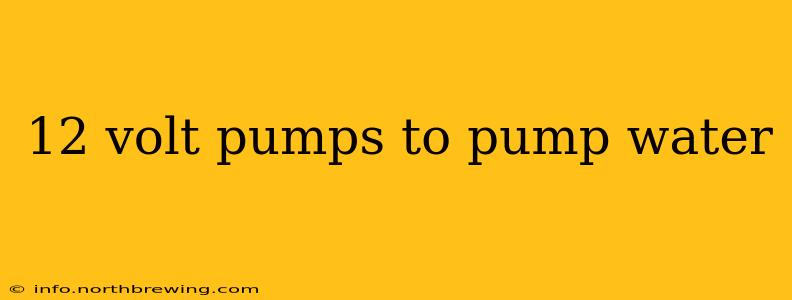Finding the right 12-volt pump for your water needs can feel overwhelming. With so many options available, understanding the different types, their applications, and key specifications is crucial. This guide will delve into the world of 12-volt water pumps, helping you choose the perfect one for your project.
What are the different types of 12-volt water pumps?
There's a wide variety of 12-volt pumps, each designed for specific applications. The most common types include:
-
Diaphragm pumps: These pumps use a flexible diaphragm to move water. They're known for their self-priming ability (ability to draw water from a source without being initially filled with water), making them ideal for applications where the pump isn't constantly submerged. They're often used in RV's, boats, and portable water systems. They are generally less efficient than centrifugal pumps, but are more tolerant of dirty water.
-
Centrifugal pumps: These pumps use a spinning impeller to create centrifugal force, pushing water outwards. They're typically more efficient than diaphragm pumps and can handle higher flow rates. However, they usually aren't self-priming and require the pump to be submerged or primed before operation. These are frequently found in larger water systems and applications demanding high volume.
-
Submersible pumps: As their name suggests, these pumps are designed to be submerged in water. This makes them perfect for drawing water from wells, ponds, or other water sources. They're often more powerful and efficient than surface pumps for this kind of application.
-
Booster pumps: These pumps increase the water pressure in an existing water system. They're commonly used to improve water pressure in homes or RVs.
What is the flow rate and pressure of a 12-volt water pump?
Flow rate (measured in gallons per minute or GPM) and pressure (measured in pounds per square inch or PSI) are critical specifications to consider. The required flow rate and pressure depend heavily on your application. A small water feature might only need a low flow rate and pressure, while a larger irrigation system will require significantly more. Always check the pump's specifications to ensure it meets your needs. Many manufacturers provide flow rate and pressure curves that show performance at different flow rates.
How much power does a 12-volt water pump consume?
The power consumption (measured in amps or watts) varies greatly depending on the pump's size and type. Larger pumps naturally consume more power. Check the pump's specifications to determine its power draw and ensure your power source (battery, solar panel, etc.) can handle the load. It's important to consider the duty cycle – how long the pump will be running continuously.
What are the applications of 12-volt water pumps?
12-volt pumps have a wide range of applications, including:
- RV and marine applications: Providing water for sinks, showers, and toilets.
- Irrigation systems: Watering gardens and lawns.
- Water features: Powering fountains and waterfalls.
- Livestock watering systems: Providing water for animals.
- Emergency water supply: Transferring water in emergency situations.
What factors should I consider when choosing a 12-volt water pump?
Choosing the right 12-volt water pump involves considering several factors:
- Flow rate and pressure: Ensure the pump meets your application's demands.
- Power consumption: Verify your power source can handle the pump's draw.
- Self-priming capability: Important if the pump won't be constantly submerged.
- Materials: Choose pumps made of corrosion-resistant materials if you're using them with saltwater or harsh chemicals.
- Durability: Consider the pump's construction and materials for long-term reliability.
- Budget: Prices vary significantly depending on pump size, features, and brand.
By carefully considering these factors, you can select a 12-volt water pump that perfectly meets your specific needs and budget. Remember to always consult the manufacturer's specifications before purchasing and installing any 12-volt pump.
